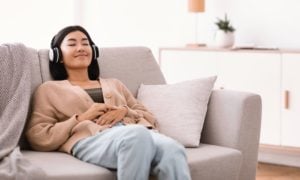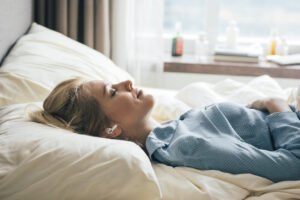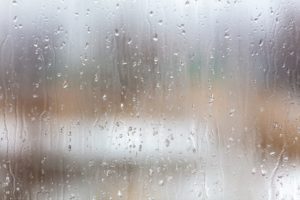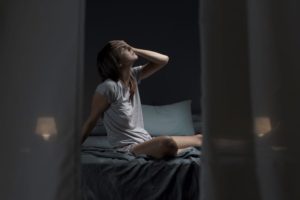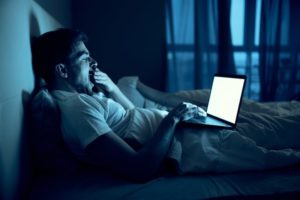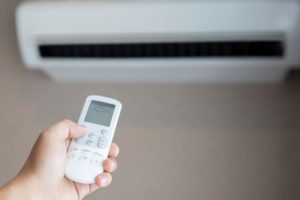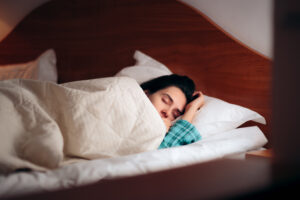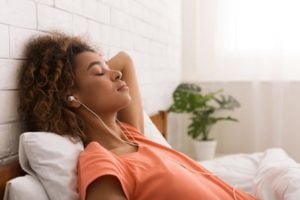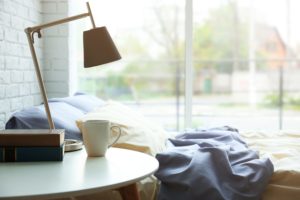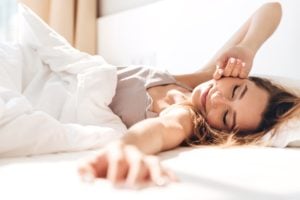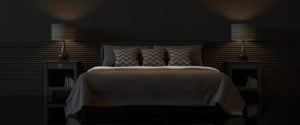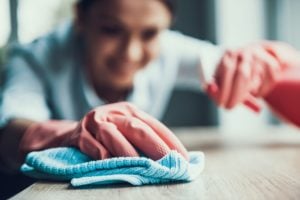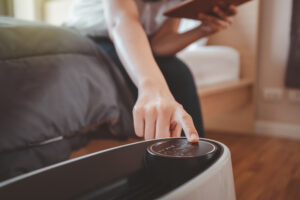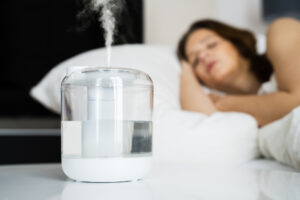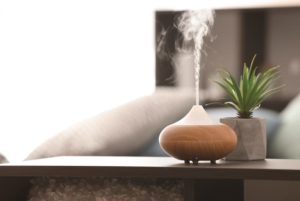Best Temperature for Sleep
- The ideal temperature for sleep is between 65-68°F.
- Thermoregulation during sleep is a crucial factor to sleep quality.
- Your body’s temperature naturally drops as you sleep so a cooler room makes it easier to fall and stay asleep.
- Optimize your bedroom by reducing heat build-up during the day, turning down the thermostat at night, and investing in cooling bedding materials.
The temperature of your bedroom can make a significant difference to your sleep quality. The best room temperature for sleep is approximately 65 degrees Fahrenheit (18.3 degrees Celsius). This may vary by a few degrees from person to person, but most doctors recommend keeping the thermostat set between 65 to 68 degrees Fahrenheit (15.6 to 20 degrees Celsius) for the most comfortable sleep.
Are You Getting Enough Deep Sleep?
A variety of issues can cause degrade your sleep quality. Answer three questions to understand if it’s a concern you should worry about.
The Best Sleep Temperature for Infants
Infants may benefit from a bedroom that is one or two degrees warmer, up to 69 degrees Fahrenheit (20.5 degrees Celsius). As their bodies are smaller and still developing, they are more sensitive to changes in ambient temperature.
A bedroom that is too warm may increase the risk of sudden infant death syndrome (SIDS). It is recommended to use approved sleepwear, ensure a favorable temperature by setting the thermostat, and avoid blankets. Parents can monitor their baby’s temperature during the night by touching their stomach or the back of their neck.
Some research suggests that babies achieve temperature maturation by eleven weeks of age , on average. At this point, they start to reach a minimum core body temperature of 97.5 degrees Fahrenheit (36.4 degrees Celsius) within four hours of bedtime, similar to adults.
How Does Temperature Affect Sleep?
The sleep cycle is regulated by the circadian rhythm. The circadian rhythm is based on the light-and-dark cycle of the sun and controlled by a part of the brain called the suprachiasmatic nucleus, located in the hypothalamus. This master “body clock” gets its cues from a number of environmental and personal factors, ranging from the amount of light exposure (most significant), to exercise, and temperature.
Your core body temperature generally hovers around 98.6 degrees Fahrenheit (37 degrees Celsius), but fluctuates by about 2 degrees Fahrenheit throughout the night. The drop in temperature starts about two hours before you go to sleep, coinciding with the release of the sleep hormone melatonin . During sleep, body temperature continues to fall, reaching a low point in the early morning and then gradually warming up as the morning progresses. Lowering the thermostat at night can work in tandem with these natural temperature fluctuations, signaling to the body that bedtime is approaching.
The principal way in which the body cools itself down for sleep is by sending heat away from the core. In a process called vasodilation, the circadian clock sends a signal to increase blood flow to the extremities. This is why some people may experience warm hands and feet – which can be mistaken for overall body temperature – at night. Additionally, people who have chronically cold feet may be at higher risk for sleep-onset insomnia, possibly due to a disruption of this process.
What Happens When Your Bedroom Is Too Hot?
Warmer temperatures can cause discomfort and restlessness, and anyone who has slept in a stuffy bedroom can attest that it is hard to nod off when they are sweaty and dehydrated. A bedroom that is too warm can interfere with the body’s thermoregulation abilities and cause fatigue . Often, a person who is fatigued will feel physically and mentally tired, but unable to fall asleep.
Body temperature also affects sleep quality and the time spent in different sleep stages. A higher core body temperature has been associated with a decrease in restorative slow-wave sleep and subjective sleep quality. Similarly, a bigger difference in temperature between the core and the extremities – which indicates that the body is not efficiently sending heat away from the core – has been associated with decreased sleep efficiency and a higher likelihood of waking up after falling asleep.

During REM sleep, the body ceases most temperature-regulation behaviors such as sweating or shivering, leaving you more sensitive to ambient temperature changes. Accordingly, excessively hot ambient temperatures also appear to lessen the time spent in REM sleep .
While a cold bedroom temperature is not considered to be as detrimental as an overly warm bedroom temperature, this can also cause discomfort and may have ramifications for REM sleep and blood pressure. In addition to causing grogginess the next day, a decrease in REM and slow-wave sleep can negatively impact bodily recovery and the immune system, as well as learning, memory, and other processes.
Tips for Keeping the Bedroom Cool
There are a number of ways to optimize your bedroom temperature for sleeping, including:
- Closing the blinds to reduce heat build-up during the day
- Moving downstairs during the summer
- Turning down the thermostat at night
- Using a fan or air conditioner in hot climates, or a hot water bottle on cold nights
- Opening the windows to promote ventilation
- Controlling bedroom humidity
- Reducing sweating by using the best mattress, sheets, duvet, comforter, pillow, and pajamas for temperature regulation
- Taking a warm bath an hour or two before bedtime to encourage a natural cool-down effect
In addition to optimizing the temperature of your sleep environment, you can help your body prepare for sleep by supporting your internal thermostat. As the circadian rhythm is sensitive to fluctuations in light, diet, and exercise, the timing of these activities can impact body temperature, and potentially sleepiness.
Sleep hygiene habits like going to bed at the same time every night, avoiding caffeine and alcohol before bed, and keeping a dark, quiet bedroom will help you set your body clock and sleeping temperature on a consistent schedule.

Still have questions? Ask our community!
Join our Sleep Care Community — a trusted hub of sleep health professionals, product specialists, and people just like you. Whether you need expert sleep advice for your insomnia or you’re searching for the perfect mattress, we’ve got you covered. Get personalized guidance from the experts who know sleep best.
References
12 Sources
-
Joseph, D., Chong, N. W., Shanks, M. E., Rosato, E., Taub, N. A., Petersen, S. A., Symonds, M. E., Whitehouse, W. P., & Wailoo, M. (2015). Getting rhythm: How do babies do it? Archives of Disease in Childhood. Fetal and Neonatal Edition, 100(1), F50–F54.
https://pubmed.ncbi.nlm.nih.gov/25245173/ -
Del Bene, V.E. (1990). Temperature. In H. K. Walker, W. D. Wall, J. W. Hurst. (Eds.). Clinical Methods: The History, Physical, and Laboratory Examinations (Chapter 18). 3rd edition. Boston: Butterworths.
https://www.ncbi.nlm.nih.gov/books/NBK331/ -
Harding, E. C., Franks, N. P., & Wisden, W. (2020). Sleep and thermoregulation. Current Opinion in Physiology, 15, 7–13.
https://pubmed.ncbi.nlm.nih.gov/32617439/ -
Lok, R., van Koningsveld, M. J., Gordijn, M., Beersma, D., & Hut, R. A. (2019). Daytime melatonin and light independently affect human alertness and body temperature. Journal of pineal research, 67(1), e12583.
https://pubmed.ncbi.nlm.nih.gov/31033013/ -
Kräuchi K. (2007). The thermophysiological cascade leading to sleep initiation in relation to phase of entrainment. Sleep medicine reviews, 11(6), 439–451.
https://pubmed.ncbi.nlm.nih.gov/17764994/ -
Fujii, H., Fukuda, S., Narumi, D., Ihara, T., & Watanabe, Y. (2015). Fatigue and sleep under large summer temperature differences. Environmental Research, 138, 17–21.
https://pubmed.ncbi.nlm.nih.gov/25682254/ -
Kräuchi, K., Fattori, E., Giordano, A., Falbo, M., Iadarola, A., Aglì, F., Tribolo, A., Mutani, R., & Cicolin, A. (2018). Sleep on a high heat capacity mattress increases conductive body heat loss and slow wave sleep. Physiology & behavior, 185, 23–30.
https://linkinghub.elsevier.com/retrieve/pii/S0031938417304365 -
McHill, A. W., Smith, B. J., & Wright, K. P., Jr (2014). Effects of caffeine on skin and core temperatures, alertness, and recovery sleep during circadian misalignment. Journal of biological rhythms, 29(2), 131–143.
http://journals.sagepub.com/doi/10.1177/0748730414523078 -
Komagata, N., Latifi, B., Rusterholz, T., Bassetti, C., Adamantidis, A., & Schmidt, M. H. (2019). Dynamic REM sleep modulation by ambient temperature and the critical role of the melanin-concentrating hormone system. Current Biology, 29(12), 1976–1987.e4.
https://linkinghub.elsevier.com/retrieve/pii/S0960982219305421 -
Okamoto-Mizuno, K., & Mizuno, K. (2012). Effects of thermal environment on sleep and circadian rhythm. Journal of Physiological Anthropology, 31(1), 14.
https://pubmed.ncbi.nlm.nih.gov/22738673/ -
Improve Sleep: Tips to Improve Your Sleep When Times Are Tough. CDC. (2020, September 22).
https://blogs.cdc.gov/niosh-science-blog/2020/06/29/sleep-hwd/ -
Haghayegh, S., Khoshnevis, S., Smolensky, M. H., Diller, K. R., & Castriotta, R. J. (2019). Before-bedtime passive body heating by warm shower or bath to improve sleep: A systematic review and meta-analysis. Sleep Medicine Reviews, 46, 124–135.
https://pubmed.ncbi.nlm.nih.gov/31102877/


